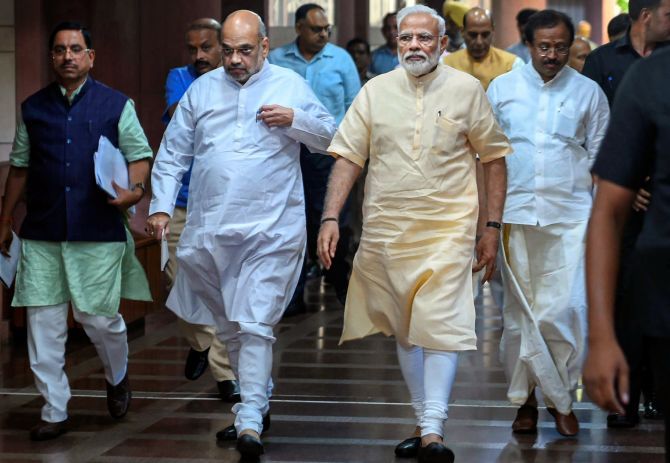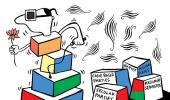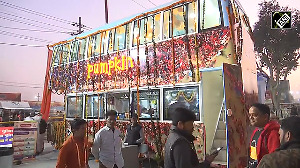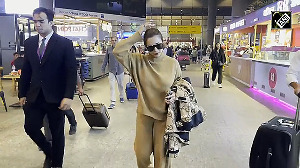'A unified Hindu votebank -- the creation of the largest and most reliable votebank in Indian politics, ever,' says Mihir S Sharma.

One line in particular stood out in Prime Minister Narendra Damodardas Modi's victory speech on the evening of counting day, May 23.
The prime minister, who was speaking of his vision for 21st century India, said there would be only two castes: Those who are poor, and those who work for the upliftment of the poor.
There are several ways to look at this statement.
The first is, perhaps, that it represents the essential ideals of the Rashtriya Swayamsevak Sangh, the organisation that groomed Modi and formed him ideologically.
Another is that it is oddly Marxist, reflecting a desire to erase caste distinctions, even if they exist, and replace them with those of class -- except with the notion of class conflict replaced with that of 'upliftment'.
Yet another is to contrast it with other forms of the poverty discourse in this country -- in some sense, Modi is talking essentially here of charity instead of empowerment.
He did not say the two castes were the rich and those who will soon be rich.
After a mandate in which Modi and his vision won a plurality of votes from every class and caste in this country with the exception of religious minorities, it is worth thinking through the relationship between the social transformation he is leading and the old hierarchies of caste.
Modi himself has made a big deal of his OBC background, which has served him well in, first, the caste politics of Uttar Pradesh where the Samajwadi Party can be decimated by the defection of non-Yadav OBCs, and, second, in distancing himself from the Brahminical leadership and traditions of the Sangh itself.
In the past, he reportedly made some startling -- in retrospect -- claims about manual scavenging and Dalits, in particular the Balmiki caste, saying that manual scavenging was not their (forced) livelihood, but a 'spiritual activity' adopted by choice over generations.
That line, close to the Sangh's own, has perhaps evolved in recent years.
Certainly, he has now called for an end to the practice of manual scavenging.
Yet in its essentials, a post-caste worldview such as Modi claims is, in a country still ridden with caste divisions, more an erasure than an aspiration.
On Twitter, Dalit writer and intellectual Chandra Bhan Prasad has usefully framed the Modi movement and mandate as a 'Savarna upraising', a 'counter-revolution, if January 26 (the date of adoption of the Constitution in 1950) was a revolution'.
Prasad believes -- in my view, accurately -- that even as Dalits of all economic backgrounds could speak as victims, upper caste individuals in India today also speak in the same manner, as victims, hoping that 'the India of the past might be revived'.
In eastern Uttar Pradesh, he recalled 'new generation Savarnas are reminded by their elders of past glory, identifying villains -- Ambedkar for the Constitution, Nehru for zamindari abolition', giving rise to a shared upper-caste consciousness that sought their 'reign restored'.
In Prasad's telling, the wiping out of 'parties that identified with Dalits/Tribals/Muslims' was the ultimate act of counter-revolutionary consolidation.
Religion and nationalism were tools, not just to create and unify an upper-caste Hindu votebank for the BJP, but also to disguise its true ends and to lure away vital components of other coalitions, such as 'extreme backward classes' -- poorer OBCs -- and, though Prasad did not mention it, young non-Jatav Dalit men.
A unified Hindu votebank, consisting of upper castes with this new shared consciousness born of past grievances as well as these new defectors seeking social mobility through Hindutva and Sanskritisation, is an unbeatable electoral coalition.
This is the real political achievement of Modi and Amit Anilchandra Shah -- the creation of the largest and most reliable votebank in Indian politics, ever.
And it follows an old, old method: The denial of social divisions, the pretension they no longer exist, in order to maintain them in another guise.
After all, 'post-caste' UP under Chief Minister Ajay Singh Bisht aka Yogi Adityanath is run mainly by Thakurs.
Counter-revolutions run by an old elite with a grievance are a potent force.
In the United States, Donald J Trump was elected essentially thanks to a white backlash following the Obama years.
Modi has done the same thing on a much larger scale, and with far greater efficiency.
Muslims are obviously excluded -- the point behind 'sab ka saath, sab ka Vikas' ('with everyone, development for everyone') was to claim that earlier dispensations had privileged some groups and thus had deprived 'meritorious' upper caste Hindus.
A similar process, but less visible, might well take place with Dalits and tribals.
The old caste-based parties -- the Bahujan Samaj Party and the Lohia-ite socialists in particular -- seem unable to take this on.
Partly because they had begun to operate around the politics of patronage more than that of ideology and consciousness-raising.
I am not in a position to offer advice to those parties or their putative successors.
However, it is and always has been true that an ideological battle is underway, and their side is losing their own.












 © 2025
© 2025